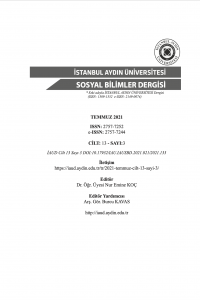ETHNORELIGIOUS POLITICAL DISPUTE, CONFLICT MANAGEMENT, LEADERSHIP, AND CIVIC INCLUSION: THE BALKANS AND GLOBALLY
Öz
The paper argues that identity politics leads to the emphasis on ethnoreligious attitudes among the bearers of political decisions, resulting in more deficient public policies and political instability. It explores theoretically and conceptually ethnoreligious identity politics of dispute, defining concepts regarding conflict management, leadership, and civic development, describing the conditions of action, and the normative resolution framework. The animosity among the ethnoreligious groups is based on polarized identities that see no way to collaborate. Observing the innovation and reinterpretation of narratives and types of collective action that shape fundamental identities can provide us with an essential view of the transformation of polarized ethnopolitical relations. The idea that the development of cooperative ties within the group and between groups in the organization, exchange of information, and expression of different opinions is the basis of moving from destructive to constructive conflict.The system reproduction model should be socially constructed dimensions of cultural and ideological differences that are the product of structured social relations. Working on understanding the emergence of deep division but with a critical view of mutually reinforcing structures, practices, and schemes that sustain "group division and antagonism" is vital. Establishing a sufficient level of interest in the new negotiating policy arrangement thanks to changes in the local and global sense, such as a declining economy, inequality, and injustice due to the reinterpretation and revaluation of people's resumes, is critical for political leaders. The public sphere is created by creating a communication space for civil discussion of common interest, putting an ethic sign in the background. Starting from the hypothesis that changing the ideas and opinions of an individual and a group-elite can create new interests-identities of a religiously divided community-nation, it certainly opens opportunities for establishing radically different interethnic relations, thus opening a new area of political communication.
Anahtar Kelimeler
Kaynakça
- 1. Bobbio, N., (1997). Democracy and Dictatorship: The Nature and Limits of State Power, Oxford: Politi Press
- 2. Freedom House, 2018., 2017., 2016., Nation in Transit Bosnia and Herzegovina https://freedomhouse.org/report/nations-transit/2018/bosnia-and-herzegovina Freedom House, 2018., 2017., 2016., Nation in Transit Croatia, https://freedomhouse.org/report/nations-transit/2018/croatia Freedom House, 2018., 2017., 2016., Nation in Transit Kosovo https://freedomhouse.org/report/nations-transit/2018/kosovo Freedom House, 2018., 2017., 2016.,Nation in Transit Serbia https://freedomhouse.org/report/nations-transit/2018/
- 3. Hadžić, F. (2020). The global context of authoritarian populism as democratic pylon to Fascism, and a tutorial from the Balkans. Journal of Scientific Papers «Social Development and Security», 10(6), 67-77. https://doi.org/10.33445/sds.2020.10.6.7
- 4. Hadžić, F. (2020). The Politicization of Religion and the Sacralized Balkan Nations Regarding Bosnia and Herzegovina, Occasional Papers on Religion in Eastern Europe: Vol. 40 : Iss. 7 , Article 8. https://digitalcommons.georgefox.edu/ree/vol40/iss7/8
- 5. Hadžić,F.,(2020). Post-Yugoslav spaces between defective democracies, authoritarianism, and kleptocracies, International Affairs and Global Strategy,Vol 86, 10.7176/IAGS/86-04
Ayrıntılar
| Birincil Dil | Türkçe |
|---|---|
| Bölüm | Araştırma Makaleleri |
| Yazarlar | |
| Yayımlanma Tarihi | 1 Temmuz 2021 |
| Yayımlandığı Sayı | Yıl 2021 Cilt: 13 Sayı: 3 |

